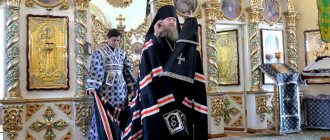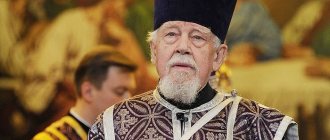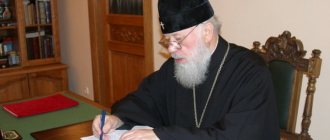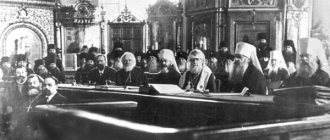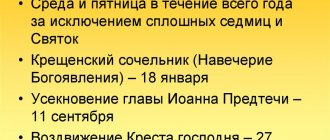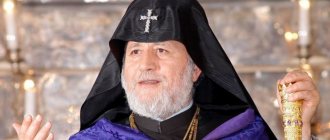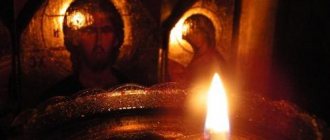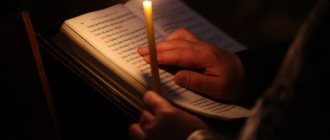What does the word "patriarch" mean?
The word consists of two Greek roots: father and dominion, beginning, power. In public life, the word “patriarch” serves to designate a person outstanding in any professional field and is used in a figurative sense. However, in the Church this term always has a completely different meaning.
Firstly, this is the name given to some Old Testament saints who not only participated in the history of salvation, but were also the direct ancestors of the Savior. The ancient patriarchs are also called ancestors or forefathers; Among them, Abraham, Isaac and Jacob are especially famous.
And secondly, the heads of some Orthodox local Churches are called patriarchs. In this meaning, the word “patriarch” does not mean a separate, highest rank of the hierarchy of the priesthood, but a special church status and title. It is assigned by the Church to the most authoritative bishop, who, as a rule, heads the main see of the country.
Who is baiting Patriarch Kirill, wanting to take his post?
Superstition, of course, is a sin, but the 13th anniversary of the patriarchate of Kirill (Gundyaev), which fell at the beginning of February, seems to be some kind of ominous sign. The Patriarch of Alexandria has taken up arms against the head of the Russian Orthodox Church and is threatening to almost anathematize him and excommunicate him. But the main thing is that, as they whisper, three possible successors are actively stalking him.
The other day, the Investigative Committee finally decided on the remains found in Porosyonkovo Log near Yekaterinburg - they claim that they are imperial. By the way, the Prosecutor General’s Office had no doubts about this a quarter of a century ago. Nevertheless, the Russian Orthodox Church was in no hurry to agree with the conclusions of the security forces - at the end of last year, the position of the church was unequivocal: “You have not convinced us”
.
However, this time the position of the Russian Orthodox Church was not completely consolidated. Metropolitan Hilarion (Alfeev)
, chairman of the Patriarchate’s Department for External Church Relations, publicly declared the “Ekaterinburg remains” to be royal.
It would seem that everything is fine - at least, according to the third most important speaker of the Russian Orthodox Church. In reality, the situation is not so simple. At one time, one of the most staunch supporters of the recognition of the remains was Metropolitan Tikhon (Shevkunov)
- in an unspoken
of the hierarchy of the Russian Orthodox Church its speaker is number two. So, today Tikhon is a categorical opponent of the recognition of the “royal remains” and openly says: “The people feel that these are not the same remains!”
Just look, the unity of the Russian Orthodox Church will be undermined on who knows whose bones!
Anathema for the patriarch?
Last fall, Patriarch Kirill
turned 75 years old - and although the patriarchal throne does not seem to limit the age of the primate, experts explain that Kirill, as the ruling bishop of the Moscow diocese, upon reaching this age must ask for resignation.
Plus, Kirill has several unpleasant stories behind him, the main complaint being his inability to resolve the “Crimean issue.” As Our Version has repeatedly reported
, all Crimean churches are still under the jurisdiction of the UOC Moscow Patriarchate, and not the Russian Orthodox Church.
They also recall Kirill’s indecisive position regarding Kiev receiving autocephaly. There is an opinion: if the Russian Orthodox Church sent its episcopate to the Unification Council of Orthodox Churches in Kyiv, the head of the newly formed OCU would certainly be “pro-Moscow”. Nevertheless, Kirill ordered the cathedral to be ignored
. The result is that the primate of the Ukrainian United Church was chosen by the “autocephalists” and “Filaretites.”
There is another unpleasant “ambush” - for some reason they hardly talk about it out loud. In January, the Council of Bishops of the Alexandria Patriarchate initiated the convening of the so-called syntax of the pentarchy, the five primates of the churches - Constantinople, Alexandria, Antioch, Jerusalem and Cyprus. The “Pentarchy” must decide on “response measures against the Russian Orthodox Church,” which is allegedly trying to “destroy the centuries-old canonical structure of the Orthodox tradition.” In the future, Patriarch Kirill may be excommunicated and anathematized. Unless, of course, the Russian Orthodox Church manages to get ahead of the curve and anathematize the Phanar along with its entire “pentarchy.”
On this topic
2723
Putin awarded Patriarch Kirill the Order of St. Andrew the First-Called
On Patriarch Kirill’s 75th birthday, Russian President Vladimir Putin awarded him the Order of St. Andrew the First-Called Apostle. The award ceremony took place in the Catherine Hall of the Kremlin.
Although what is Phanar, if the source of another, no less, threat is located right next to the patriarch. If you believe the rumors, three of his possible replacements are already asleep and dreaming of how to quickly try on the patriarchal hood.
“Royal remains” as a reason to fight
Everyone knows two potential replacements for Patriarch Kirill well: Metropolitan Tikhon and Metropolitan Hilarion. If there had been a battle for power in the Russian Orthodox Church, the competing parties could enthusiastically throw open the doors of the closets, removing skeletons from there and putting them on display, but the church in time (and for once sensibly!) assessed the possible consequences of such competition. And they made a decision: the public polemic between Hilarion and Tikhon will be built around the recognition (or non-recognition) of the “royal remains.” The campaign, in fact, has already begun. Hilarion assures that the TFR cannot make mistakes, and therefore the remains are genuine, and Tikhon, in turn, appeals to the people. Like, since the people “feel” that the remains are “not the same”, therefore, it is so.
In fact, there is no talk at all about any recognition of the results of the examination by the Council of Bishops (at the end of last year the council was even canceled - precisely in order not to recognize the remains, adhering to the line drawn under Patriarch Alexy II
). The applicant priests are only given the opportunity to use a high-profile informational reason for a dispute in the public field. Without getting personal and thus not dirtying the church.
The Russian Orthodox Church has its own Gorbachev
You may ask: who is the third contender? Oh, this is intrigue! It is precisely because of this very third contender that the Phanar, according to rumors, is gathering its “pentarchy” - not so much to deal with Kirill, but to prevent Metropolitan Leonid (Gorbachev) from flying high (or knocking down his flight, if you like )
. Gorbachev was elevated to metropolitan a little over a month ago. And behind his back they call him the “African Exarch.” Russia's exploration of Africa is progressing at lightning speed. And following the “new missionaries” represented by raw materials corporations and PMCs, as it turns out, the Russian Orthodox Church is also advancing. And Metropolitan Leonid in this sense is a real pioneer. There is another, so to speak, affair. The jurisdiction of the Patriarchate of Alexandria (member of the self-proclaimed “pentarchy”) includes Egypt, Libya and Ethiopia. With a claim – in the future – on the rest of Africa. However, the expansion of the Russian Orthodox Church and Metropolitan Leonid personally turned out to be so rapid that the dreams of the “Alexandrians” were immediately nullified (they would now have to retain Ethiopia).
“Currently, a full-scale program is being developed not only for the development of parishes in Africa, but also for the full presence of the Russian Orthodox Church on the continent, including liturgical, educational, social, and humanitarian components,” the newly converted metropolitan confirmed in his speech on January 12 (he became a metropolitan on the 7th). Novaya Gazeta, citing a source in the Patriarchate of Alexandria, reports that “the Russian Orthodox Church offers black priests a salary 4 times more than their current dioceses.” And this is one of Gorbachev’s merits. One way or another, the successes of Metropolitan Leonid in Africa are such that no other successes of any other dignitaries of the Russian Orthodox Church can yet be compared with them. And “signals are coming” that it is Leonid who can become Patriarch Kirill’s successor.
Who was the first patriarch?
The first patriarch is considered to be Saint James, an apostle from among the seventy disciples of the Savior and the first bishop of the first in seniority of the Church of Jerusalem. According to legend, Jacob was the son of Joseph the Betrothed from his first marriage, therefore in the Gospel he is also called the brother of the Lord, although Jesus Christ has no blood relationship with Jacob.
The New Testament contains one letter written by the Apostle James, and since this apostle led the very first Christian community, this letter is listed first in the Bible, even before the letters of the Apostle Peter.
The authority of James as the first patriarch was indisputable, which is clearly seen from the description of the very first church council, held in Jerusalem (Acts 15). It was the Apostle James who made the decision on the question that most worried the community of the first Christians at that time: should those who converted to Christianity from paganism perform the rituals that were commanded to the Jews in the Old Testament? Patriarch Jacob advised not to make it difficult for pagans turning to God (Acts 15:19), and since then almost all ritual decrees of the Old Testament have ceased to be obligatory for Christians.
Personal life of Patriarch Kirill
When, after a scandal involving property damaged by dust, it became clear that in the ill-fated apartment of Patriarch Kirill on the street. A certain Lidiya Mikhailovna Leonova was registered as Serafimovich, and as expected, there was a fuss in the press. From her biography, journalists only found out that she is the daughter of a cook at the Leningrad Regional Committee of the CPSU.
Journalists believe that in this photo Vladimir Gundyaev was photographed with Lydia Leonova and their son
Despite the fact that the patriarch personally called her his second cousin, in the press she was called “Kirill Gundyaev’s partner,” and he himself was called “an exemplary family man,” and even cited as an example a photograph of them together in 1988. However, the statement about any love affair between them does not stand up to criticism, because Patriarch Kirill completely abandoned his personal life in the name of serving the Lord. Accordingly, he cannot have a wife (let alone a cohabitant) or children.
What can't a patriarch do?
Since patriarch is not a degree of priesthood, but only an honorary title, then, in essence, its bearer has no more rights than any other bishop. The Patriarch is obeyed not because he is “superior” to others, but because he has authority among the bishops. All the power of the patriarch is limited by the internal canons of the Church and the personal authority of the shepherd. For example, the patriarch cannot single-handedly appoint new bishops or make decisions with which other authoritative members of the bishops' council do not agree.
Responsibilities of the Patriarch
The Patriarch, as the high priest, heads the prayer ministry of the Church and almost always personally performs the most solemn services. He also determines the relationship of the Church with the state and public organizations, which means that he must continuously, sometimes literally around the clock, perform representative and organizational functions. The patriarch is also obliged to preside over the Holy Synod, which is the highest church authority in the period between church councils. With his participation, the appointment of bishops takes place, so he must delve into the details of all internal church affairs. The Patriarch is obliged to take upon himself the solution of all major issues, both spiritual and completely earthly - such as the financing of theological academies or appointments to important posts in the Patriarchate.
In addition, the Patriarch of Moscow and All Rus' is the head of the capital's Moscow diocese. And the Patriarch of Moscow and All Rus' manages patriarchal metochions throughout the country, as well as the so-called stauropegial monasteries, subordinate not to local bishops, but directly to the Moscow Patriarchate.
Russian Orthodox Church
The initial draft of this document was drawn up by the Inter-Council Presence commission on issues of church governance and mechanisms for implementing conciliarity in the Church during the period from January 29 to October 1, 2010. On April 14, 2011, the draft was revised by the editorial commission of the Inter-Council Presence, chaired by the Patriarch.
Having considered the draft on June 15, 2011, the Presidium of the Inter-Council Presence decided to send it to the dioceses of the Russian Orthodox Church to receive feedback and publish it for the purpose of discussion. On the portal Bogoslov.ru and on the official blog of the Inter-Council Presence, everyone is given the opportunity to leave their comments.
Explanatory note to the draft amendments to the Charter
Considering the topic “The procedure and criteria for electing the Patriarch of Moscow and All Rus',” the commission of the Inter-Council presence on issues of church governance and mechanisms for implementing conciliarity in the Church studied the reports and proposals of commission members, as well as feedback received from dioceses, theological academies and church-public associations1.
The proposals submitted to the commission boil down to the following options:
1. The Patriarch is elected by the Local Council from candidates presented by the Council of Bishops, but the Local Council does not have the right to nominate its own candidates.
2. The Patriarch is elected by the Council of Bishops (or the Council of Bishops as part of the Local Council) from candidates presented by the Local Council.
3. The Patriarch is elected by the Council of Bishops from candidates determined at the Council of Bishops itself.
4. The Patriarch is elected by the Local Council from candidates presented by the Council of Bishops, according to the procedure of the Councils of 1990 and 2009.
Other issues raised in reviews and commission meetings
About the voting form
In favor of secret voting, it was pointed out that it not only corresponds to the established historical practice, but also more clearly emphasizes the manifestation of the will of God through the participants of the Local Council, according to the word of Holy Scripture: “It pleased the Holy Spirit and us” (Acts 15:18). With an open form of voting, elections become vulnerable to the possible influence of external forces on the decision of the Council and pressure on individual delegates, which is unacceptable.
Arguments in favor of the lot were based on rare historical precedents.
About the practice of self-recusal
The Commission is inclined to believe that self-recusal can take place at any stage of voting, since the free will of possible candidates for the Patriarchal throne should not be constrained. If, as a result of self-recusal, one candidate remains, the Council may, but is not obligated to, elect another candidate.
1. Draft Regulations on the election of the Patriarch of Moscow and All Russia (according to option 1)
1. The Council of Bishops elects candidates to the Moscow Patriarchal throne by secret ballot.
2. All bishops of the Russian Orthodox Church who meet the criteria provided for by the Charter of the Russian Orthodox Church for candidates for the Patriarchal Throne are included in the ballot for electing candidates to the Moscow Patriarchal Throne. The Holy Synod is responsible for compiling such a list of bishops.
3. Before the start of voting, the chairman of the counting commission, in the presence of members of the commission, checks the condition of the ballot boxes and seals them with the seal of the counting commission.
4. Voting papers are issued by the counting commission against the signature of each participant, upon presentation of the participant’s identification card.
The ballot consists of laced, numbered and sealed sheets containing a complete list of possible candidates for the Moscow Patriarchal throne, with space for putting a sign next to each name.
The Counting Commission is responsible for counting the issued ballots.
5. Voting takes place by placing any sign next to the name of the candidate for whom the vote is cast.
The ballot is considered invalid in the following cases:
1) if more than one name is marked on the ballot;
2) if no name is marked on the ballot;
3) if there are no sheets in the ballot.
6. Counting commission:
1) checks the number of ballots in the ballot boxes with the number of issued ballots and identifies invalid ballots;
2) carries out the counting of votes by passing each ballot through each member of the counting commission, starting with the youngest, ending with the chairman;
3) draws up a protocol on the voting results in each round.
7. In case of an error when filling out a ballot, a member of the Council has the right to contact the counting commission to replace the ballot; in this case, the damaged ballot is handed over to the counting commission, canceled by its chairman and a new ballot is issued, about which an act is drawn up.
8. The three bishops who receive the largest number of votes are considered the elected candidates.
If in the first round of voting several candidates received an equal number of votes and this does not make it possible to determine the three elected, a repeat vote is held for those who received an equal number of votes.
9. Those elected have the right to recuse themselves. In this case, the list of candidates is replenished by including the following (based on the number of votes received in the first round) bishops.
If all three candidates recuse themselves, a repeat vote will be held.
10. The voting results are presented to the Local Council, which opens no later than on the third day after the nomination of candidates for the Patriarchal throne.
11. The Locum Tenens of the Patriarchal Throne presides at the Local Council, with the exception of meetings during which voting is carried out on the election of the Patriarch, in the event that the Locum Tenens is elected as a candidate for the Patriarchal Throne. In this case, the Locum Tenens transfers the presidency to the oldest by consecration of the permanent members of the Holy Synod who are not candidates for the Patriarchal throne. After the election of the Patriarch, the presidency of the Local Council belongs to the elected Patriarch.
12. Members of the Council by secret ballot elect from among the approved candidates the Patriarch of Moscow and All Rus' according to the following procedure:
1) before the start of voting, the chairman of the counting commission, in the presence of members of the commission, checks the condition of the ballot boxes and seals them with the seal of the counting commission;
2) ballot papers are issued by the counting commission against signature, upon presentation of an ID card of a member of the Council; the ballot contains a list of hierarchs nominated for voting, with space for putting a sign next to each name; the ballot is sealed by the counting commission; the counting commission is responsible for counting the issued ballots;
3) the ballot is considered invalid in the following cases:
a. if more than one name is marked on the ballot;
b. if no name is marked on the ballot;
4) counting commission:
a. checks the number of ballots in the ballot boxes with the number of issued ballots and determines the validity of the ballots;
b. carries out the counting of votes by passing each ballot through each member of the counting commission, starting with the youngest and ending with the chairman;
c. draws up a protocol on the voting results in each round;
5) in the event of an error when filling out a ballot, a member of the Council has the right to contact the counting commission to replace the ballot; in this case, the damaged ballot is handed over to the counting commission, canceled by its chairman, and the delegate is given a new ballot, about which a report is drawn up.
13. When voting in the first round, the elected Patriarch is the bishop who receives more than half of the number of votes cast, expressed in valid ballots.
If none of the candidates received more than half of the votes in the first round of voting, a repeat vote is held on the two candidates who received the most votes in the first round of voting. The elected Patriarch is the bishop who receives the largest number of votes.
If in the second round of voting both candidates received an equal number of votes, the bishop who received the greater number of votes in the final vote at the Council of Bishops is considered elected Patriarch.
14. Candidates for the Moscow Patriarchal throne have the right to recuse themselves at any stage of voting. If, as a result of self-recusal, one candidate remains, then, by decision of the Local Council, the bishops present at it, who have the right to vote at the Council of Bishops, can elect at least one more candidate by secret ballot. Such a bishop must meet the criteria provided for by the Charter of the Russian Orthodox Church for candidates for the Patriarchal throne. If the Local Council refuses to nominate another candidate, then a vote is taken on the remaining candidate. In this case, the elected Patriarch becomes the bishop in whose favor more than half of the distributed ballots were cast. If there is only one candidate, the ballot paper has fields for putting in “for” and “against” signs.
2. Draft Regulations on the election of the Patriarch of Moscow and All Russia (according to option 2)
1. The Local Council elects candidates to the Moscow Patriarchal throne by secret ballot.
2. All bishops of the Russian Orthodox Church who meet the criteria provided for by the Charter of the Russian Orthodox Church for candidates for the Patriarchal Throne are included in the ballot for electing candidates to the Moscow Patriarchal Throne. The Holy Synod is responsible for compiling such a list of bishops.
3. Before the start of voting, the chairman of the counting commission, in the presence of members of the commission, checks the condition of the ballot boxes and seals them with the seal of the counting commission.
4. Voting papers are issued by the counting commission against the signature of each participant, upon presentation of the participant’s identification card.
The ballot consists of laced, numbered and sealed sheets containing a complete list of possible candidates for the Moscow Patriarchal throne, with space for putting a sign next to each name.
The Counting Commission is responsible for counting the issued ballots.
5. Voting takes place by placing any sign next to the name of the candidate for whom the vote is cast.
The ballot is considered invalid in the following cases:
1) if more than one name is marked on the ballot;
2) if no name is marked on the ballot;
3) if there are no sheets in the ballot.
6. Counting commission:
1) checks the number of ballots in the ballot boxes with the number of issued ballots and identifies invalid ballots;
2) carries out the counting of votes by passing each ballot through each member of the counting commission, starting with the youngest, ending with the chairman;
3) draws up a protocol on the voting results in each round.
7. In case of an error when filling out a ballot, a member of the Council has the right to contact the counting commission to replace the ballot; in this case, the damaged ballot is handed over to the counting commission, canceled by its chairman and a new ballot is issued, about which an act is drawn up.
8. The three bishops who receive the largest number of votes are considered the elected candidates.
If in the first round of voting several candidates received an equal number of votes and this does not make it possible to determine the three elected, a repeat vote is held for those who received an equal number of votes.
9. Those elected have the right to recuse themselves. In this case, the list of candidates is replenished by including the following (based on the number of votes received in the first round) bishops.
If all three candidates recuse themselves, a repeat vote will be held.
10. The voting results are presented to the Council of Bishops, which opens no later than on the third day after the nomination of candidates for the Patriarchal throne.
11. The Locum Tenens of the Patriarchal Throne presides at the Council of Bishops, except in the case when he is elected as a candidate for the Patriarchal Throne. In this case, the Council of Bishops is presided over by the oldest of the permanent members of the Holy Synod who are not candidates for the Patriarchal throne.
12. Members of the Council of Bishops may nominate an additional candidate for the Moscow Patriarchal throne with a statement from at least 1/10 of their members. Such a bishop must meet the criteria provided for by the Charter of the Russian Orthodox Church for candidates for the Patriarchal throne. To include him among the candidates for the Moscow Patriarchal throne, a secret vote is held. The bishop who receives at least a third of the votes is included in the list of candidates.
13. Members of the Council by secret ballot elect from among the approved candidates the Patriarch of Moscow and All Rus', according to the following procedure:
1) before the start of voting, the chairman of the counting commission, in the presence of members of the commission, checks the condition of the ballot boxes and seals them with the seal of the counting commission;
2) ballot papers are issued by the counting commission against signature, upon presentation of an ID card of a member of the Council; the ballot contains a list of hierarchs nominated for voting, with space for putting a sign next to each name; the ballot is sealed by the counting commission; the counting commission is responsible for counting the issued ballots;
3) The ballot is considered invalid in the following cases:
a. if more than one name is marked on the ballot;
b. if no name is marked on the ballot;
4) counting commission:
a. checks the number of ballots in the ballot boxes with the number of issued ballots and determines the validity of the ballots;
b. carries out the counting of votes by passing each ballot through each member of the counting commission, starting with the youngest and ending with the chairman;
c. draws up a protocol on the voting results in each round;
5) in the event of an error when filling out a ballot, a member of the Council has the right to contact the counting commission to replace the ballot; in this case, the damaged ballot is handed over to the counting commission, canceled by its chairman, and a new ballot is issued to the delegate, about which a report is drawn up.
14. When voting in the first round, the elected Patriarch is the bishop who receives more than half of the number of votes cast, expressed in valid ballots.
If none of the candidates received more than half of the votes in the first round of voting, a repeat vote is held on the two candidates who received the most votes in the first round of voting. The elected Patriarch is the bishop who receives the largest number of votes.
If in the second round of voting both candidates received an equal number of votes, the elected Patriarch is considered to be the bishop who received the greater number of votes in the final vote at the Local Council.
15. Candidates for the Moscow Patriarchal throne have the right to recuse themselves at any stage of voting. If, as a result of self-recusal, one candidate remains, then, by decision of the Council of Bishops, the bishops present at it and having the right to vote can elect at least one more candidate by secret ballot. Such a bishop must meet the criteria provided for by the Charter of the Russian Orthodox Church for candidates for the Patriarchal throne. If the Council of Bishops refuses to nominate another candidate, then a vote is taken on the remaining candidate. In this case, the elected Patriarch becomes the bishop in whose favor more than half of the distributed ballots were cast. If there is only one candidate, the ballot paper has fields for putting in “for” and “against” signs.
3. Draft Regulations on the election of the Patriarch of Moscow and All Russia (according to option 3)
1. The Council of Bishops by secret ballot elects the Patriarch of Moscow and All Rus' during one or more rounds of voting.
2. The ballot for the election of the Patriarch of Moscow and All Rus' includes all bishops of the Russian Orthodox Church who meet the criteria provided for by the Charter of the Russian Orthodox Church for candidates for the Patriarchal throne. The Holy Synod is responsible for compiling such a list of bishops.
3. Before the start of voting, the chairman of the counting commission, in the presence of members of the commission, checks the condition of the ballot boxes and seals them with the seal of the counting commission.
4. Voting papers are issued by the counting commission against the signature of each participant, upon presentation of the participant’s identification card.
The ballot consists of laced, numbered and sealed sheets containing a complete list of candidates for the Moscow Patriarchal throne, with space for putting a sign opposite each name.
The Counting Commission is responsible for counting the issued ballots.
5. Voting takes place by placing any sign next to the name of the candidate for whom the vote is cast.
The ballot is considered invalid in the following cases:
1) if more than one name is marked on the ballot;
2) if no name is marked on the ballot;
3) if there are no sheets in the ballot.
6. Counting commission:
1) checks the number of ballots in the ballot boxes with the number of issued ballots and identifies invalid ballots;
2) carries out the counting of votes by passing each ballot through each member of the counting commission, starting with the youngest, ending with the chairman;
3) draws up a protocol on the voting results in each round.
7. In case of an error when filling out a ballot, a member of the Council has the right to contact the counting commission to replace the ballot; in this case, the damaged ballot is handed over to the counting commission, canceled by its chairman and a new ballot is issued, about which an act is drawn up.
8. If one of the candidates receives in the first round more than half of the number of votes cast, expressed in valid ballots, he is elected Patriarch of Moscow and All Rus'.
9. If none of the candidates receives more than half of the votes in the first round, a second round is held among the three candidates who received the largest number of votes.
If in the first round of voting several candidates received an equal number of votes and this does not make it possible to determine three candidates for the second round, a repeat vote is held among those who received an equal number of votes.
10. The Council of Bishops is presided over by the Locum Tenens of the Patriarchal Throne, with the exception of meetings during which voting is carried out on the election of the Patriarch, in the event that the Locum Tenens is elected as a candidate for the Patriarchal Throne. In this case, the Locum Tenens transfers the presidency to the oldest by consecration of the permanent members of the Holy Synod who are not candidates for the Patriarchal throne. After the election of the Patriarch, the presidency of the Council of Bishops belongs to the elected Patriarch.
11. Candidates for the second round have the right to recuse themselves. In this case, the list of candidates is replenished by including the following (based on the number of votes received in the first round) bishops.
If all three candidates withdraw from the second round, a repeat vote will be held.
12. Voting in the second round is carried out according to the procedure provided for in paragraphs. 3-7 of these Regulations for the first round. In the second round, the ballot is considered invalid in the following cases:
a. if more than one name is marked on the ballot;
b. if no name is marked on the ballot.
13. When voting in the second round, the elected Patriarch is the bishop who receives more than half of the number of votes cast, expressed in valid ballots.
If none of the candidates received more than half of the votes in the second round of voting, a third round of voting is held for the two candidates who received the most votes in the second round of voting. The elected Patriarch is the bishop who receives the largest number of votes.
If in the third round of voting both candidates received an equal number of votes, the elected Patriarch is considered to be the bishop who received the greater number of votes in the second round.
14. Candidates for the Moscow Patriarchal throne have the right to recuse themselves at any stage of voting. If, as a result of self-recusal, one candidate remains, then, by decision of the Council of Bishops, the bishops present at it and having the right to vote can elect at least one more candidate by secret ballot. Such a bishop must meet the criteria provided for by the Charter of the Russian Orthodox Church for candidates for the Patriarchal throne. If the Council of Bishops refuses to nominate another candidate, then a vote is taken on the remaining candidate. In this case, the elected Patriarch becomes the bishop in whose favor more than half of the distributed ballots were cast. If there is only one candidate, the ballot paper has fields for putting in “for” and “against” signs.
4. Draft Regulations on the election of the Patriarch of Moscow and All Russia (according to option 4)
1. The Council of Bishops elects candidates to the Moscow Patriarchal throne by secret ballot.
2. All bishops of the Russian Orthodox Church who meet the criteria provided for by the Charter of the Russian Orthodox Church for candidates for the Patriarchal Throne are included in the ballot for electing candidates to the Moscow Patriarchal Throne. The Holy Synod is responsible for compiling such a list of bishops.
3. Before the start of voting, the chairman of the counting commission, in the presence of members of the commission, checks the condition of the ballot boxes and seals them with the seal of the counting commission.
4. Voting papers are issued by the counting commission against the signature of each participant, upon presentation of the participant’s identification card.
The ballot consists of laced, numbered and sealed sheets containing a complete list of possible candidates for the Moscow Patriarchal throne, with space for putting a sign next to each name.
The Counting Commission is responsible for counting the issued ballots.
5. Voting takes place by placing any sign next to the name of the candidate for whom the vote is cast.
The ballot is considered invalid in the following cases:
1) if more than one name is marked on the ballot;
2) if no name is marked on the ballot;
3) if there are no sheets in the ballot.
6. Counting commission:
1) checks the number of ballots in the ballot boxes with the number of issued ballots and identifies invalid ballots;
2) carries out the counting of votes by passing each ballot through each member of the counting commission, starting with the youngest, ending with the chairman;
3) draws up a protocol on the voting results in each round.
7. In case of an error when filling out a ballot, a member of the Council has the right to contact the counting commission to replace the ballot; in this case, the damaged ballot is handed over to the counting commission, canceled by its chairman and a new ballot is issued, about which an act is drawn up.
8. The three bishops who receive the largest number of votes are considered the elected candidates.
If in the first round of voting several candidates received an equal number of votes and this does not make it possible to determine the three elected, a repeat vote is held for those who received an equal number of votes.
9. Those elected have the right to recuse themselves. In this case, the list of candidates is replenished by including the following (based on the number of votes received in the first round) bishops.
If all three candidates recuse themselves, a repeat vote will be held.
10. The voting results are presented to the Local Council, which opens no later than on the third day after the nomination of candidates for the Patriarchal throne.
11. The Locum Tenens of the Patriarchal Throne presides at the Local Council, with the exception of meetings during which voting is carried out on the election of the Patriarch, in the event that the Locum Tenens is elected as a candidate for the Patriarchal Throne. In this case, the Locum Tenens transfers the presidency to the oldest by consecration of the permanent members of the Holy Synod who are not candidates for the Patriarchal throne. After the election of the Patriarch, the presidency of the Local Council belongs to the elected Patriarch.
12. Members of the Local Council may nominate an additional candidate for the Moscow Patriarchal throne with a statement from at least 1/10 of their members. Such a bishop must meet the criteria provided for by the Charter of the Russian Orthodox Church for candidates for the Patriarchal throne. To include him among the candidates for the Moscow Patriarchal throne, a secret vote is held. The bishop who receives at least a third of the votes is included in the list of candidates.
13. Members of the Council by secret ballot elect from among the candidates the Patriarch of Moscow and All Rus', according to the following procedure:
1) before the start of voting, the chairman of the counting commission, in the presence of members of the commission, checks the condition of the ballot boxes and seals them with the seal of the counting commission;
2) ballot papers are issued by the counting commission against signature, upon presentation of an ID card of a member of the Council; the ballot contains a list of hierarchs nominated for voting, with space for putting a sign next to each name; the ballot is sealed by the counting commission; the counting commission is responsible for counting the issued ballots;
3) The ballot is considered invalid in the following cases:
a. if more than one name is marked on the ballot;
b. if no name is marked on the ballot;
4) counting commission:
a. checks the number of ballots in the ballot boxes with the number of issued ballots and determines the validity of the ballots;
b. carries out the counting of votes by passing each ballot through each member of the counting commission, starting with the youngest and ending with the chairman;
c. draws up a protocol on the voting results in each round;
5) in the event of an error when filling out a ballot, a member of the Council has the right to contact the counting commission to replace the ballot; in this case, the damaged ballot is handed over to the counting commission, canceled by its chairman, and a new ballot is issued to the delegate, about which a report is drawn up.
14. When voting in the first round, the elected Patriarch is the bishop who receives more than half of the number of votes cast, expressed in valid ballots.
If none of the candidates received more than half of the votes in the first round of voting, a repeat vote is held on the two candidates who received the most votes in the first round of voting. The elected Patriarch is the bishop who receives the largest number of votes.
If in the second round of voting both candidates received an equal number of votes, the bishop who received the greater number of votes in the final vote at the Council of Bishops is considered elected Patriarch.
15. Candidates for the Moscow Patriarchal throne have the right to recuse themselves at any stage of voting. If, as a result of self-recusal, one candidate remains, then, by decision of the Local Council, the bishops present at it, who have the right to vote at the Council of Bishops, can elect at least one more candidate by secret ballot. Such a bishop must meet the criteria provided for by the Charter of the Russian Orthodox Church for candidates for the Patriarchal throne. If the Local Council refuses to nominate another candidate, then a vote is taken on the remaining candidate. In this case, the elected Patriarch becomes the bishop in whose favor more than half of the distributed ballots were cast. If there is only one candidate, the ballot paper has fields for putting in “for” and “against” signs.
Notes:
1 ― World Russian People's Council; Byzantine club "Katekhon"; Preobrazhenskoye Brotherhood; Orthodox society (brotherhood) "Radonezh"; Russia is Orthodox; Union of Orthodox Brotherhoods; Council of Orthodox Youth Organizations of Moscow; Union of Orthodox Citizens; The Patriarchal Center for the Spiritual Development of Youth, as well as the Council of Orthodox Public Associations under the Synodal Department for Relations between the Church and Society.
Proposed amendments to the Statute of the Russian Orthodox Church
| Current Charter | Proposed Changes |
| Chapter II. Local Council | |
| f) elects the Patriarch of Moscow and All Rus' and establishes the procedure for such election; | f) elects the Patriarch of Moscow and All Russia in accordance with the “Regulations on the election of the Patriarch of Moscow and All Russia” and establishes the procedure for such election. During the period of widowhood of the Patriarchal Throne, the “Regulations on the election of the Patriarch of Moscow and All Rus'” cannot be changed. |
| Chapter IV. Patriarch of Moscow and All Rus' | |
| 16. No later than six months after the vacancy of the Patriarchal Throne, the Locum Tenens and the Holy Synod, in the manner prescribed by paragraph 2 of Section II of this Charter, convene a Local Council to elect a new Patriarch of Moscow and All Rus'. 17. A candidate for Patriarchate must meet the following requirements: a) be a bishop of the Russian Orthodox Church; b) have a higher theological education, sufficient experience in diocesan administration, and be distinguished by their commitment to the canonical legal order; c) enjoy a good reputation and trust of the hierarchs, clergy and people; d) “have a good testimony from outsiders” (1 Tim. 3:7); d) be at least 40 years old. | 16. Not later forty days upon the release of the Patriarchal Throne, the Locum Tenens and the Holy Synod, in the manner prescribed by clause 2 of Section II of this Charter, convene a Local Council (or: Council of Bishops - depending on the version of the Regulations) for the election of a new Patriarch of Moscow and All Rus'. 17. A candidate for Patriarchate must meet the following requirements: a) be a bishop of the Russian Orthodox Church; b) have a higher theological education (*) , sufficient experience in diocesan administration, and be distinguished by their commitment to canonical law and order; c) enjoy a good reputation and trust of the hierarchs, clergy and people; d) “have a good testimony from outsiders” (1 Tim. 3:7); d) be at least 40 years old. ——————————— (*) have a candidate of theology degree in the system of theological education approved by the Council of Bishops in 2011, or completed academic education. |
Can the Church live without a patriarch?
Since the patriarch is not the bearer of any special sacred power over the Church, but simply has the highest authority among bishops, there are periods in the history of the Church when the patriarch was not elected. Thus, after the death of Patriarch Adrian in 1700, Tsar Peter I, who wanted to subordinate the Church to secular power, prevented the holding of independent elections of the primate and appointed a “locum tenens of the patriarchal throne” in the place of the patriarch. And in 1721 he established the Holy Governing Synod, which since then has been the highest state body of church-administrative power of the Russian Empire and replaced the patriarch in terms of general church functions and external relations.
As a meeting of canonical bishops, the Synod as the supreme body of church government was recognized by all Eastern Patriarchs and other autocephalous Churches. However, the Synod could not make independent decisions, since its members were appointed personally by the emperor, who was in charge of all personnel matters. The Emperor also had a personal representative in the Holy Synod - the Chief Prosecutor, who actually had full power over the church life of the country. Nominally, the chief prosecutor was a government official, and therefore might not even be an Orthodox Christian, as sometimes happened.
The synodal period in the Russian Orthodox Church lasted almost two hundred years, and only at the beginning of the 20th century was the Church able to elect a primate again.
Childhood and family
Vladimir Gundyaev was born in Leningrad on November 20, 1946 into a religious family, despite the anti-church sentiment that reigned in those years.
His grandfather Vasily Stepanovich (b. 1879), a native of Lukoyanovsky district, was a machinist by training, and he himself began to study theological literature. In 1922, he ended up in Solovki following a denunciation by the Renovationists (a religious movement that stood in opposition to the Orthodox Church after the revolution and for some time was supported by the Bolsheviks), of whom he was an opponent. But even in the camp, Vasily did not abandon his faith, he held secret services, for which he once spent a month in a punishment cell. The Christian remained in exile until 1955.
Vasily Stepanovich Gundyaev
The father of the future patriarch, Mikhail Vasilyevich Gundyaev (b. 1907), dreamed of becoming a clergyman from a young age. After leaving school, he worked for some time as an assistant in Lukoyanov’s church, and in 1926 he moved to Leningrad, where he entered the Higher Theological Courses. He regularly attended all lectures and wrote them down verbatim.
Mikhail Vasilievich Gundyaev
Two years later the courses were closed, Mikhail went into the army. After serving, he entered a technical school, then an industrial university. Initially, he planned to go to study to become a doctor, but because of the mark on theological courses in his personal file, he was turned away. In 1934, he was arrested in the “Kirov case” for serving in church and singing in the choir - just a few days before the wedding. Mikhail was accused of attempting to kill Joseph Stalin.
Parents of Patriarch Kirill
His wife, Raisa Vladimirovna Kuchina (born 1909), taught German at school. Also being a religious person, she enjoyed singing in the church choir, where she met her future husband.
Together with his wife, Mikhail spent three years in Kolyma, then returned to Leningrad and worked at a factory. In 1940, the first-born Nikolai was born. During the war years, Mikhail helped strengthen the city during the siege, and in 1943 he went to the front. After the victory, the family began to live in the city, which was recovering from the blockade, and soon their second son, Vladimir, was born. At this time, the state began to establish a dialogue with the church, and therefore Gundyaev, risking losing his high position in society, nevertheless asked for ordination. In 1947, Mikhail was elevated to the rank of deacon and assigned to the Church of the Smolensk Icon of the Mother of God.
Patriarch Kirill (Vladimir Gunyadev) in childhood
Two years later, relations between church and state that had been warming began to deteriorate again. For his service, Mikhail was imposed an unimaginable fine at that time - 120 thousand rubles (for comparison, for the Pobeda car, which cost about 15 thousand, even wealthy people saved for years). Part of the money was collected from Leningrad parishes, but until Mikhail’s death, the large family (besides Nikolai and Vladimir, the couple had a daughter, Elena, born in 1949), was constantly in debt and suffered terrible poverty. Saved by grateful parishioners who helped out with food.
Vladimir, Elena and Nikolai Gundyaev
The formation of Vladimir’s views was greatly influenced by his grandfather, who returned home in the mid-50s. He told his grandson that even during the most severe camp trials, which claimed the lives of most people, he never felt fear. “For me it was a living experience and a living image of a person who knew what God’s love is,” the patriarch later recalled.
Every school day was a test for Vladimir. An opponent of the communist regime, he became neither a pioneer nor a Komsomol member. When the school director convinced Gundyaev to wear a pioneer tie, he replied: “Okay. If you don't mind me wearing a red tie to church. Because I will." Constant teacher councils and beatings from the director did not prevent Vova from studying well. The soul of the future patriarch lay in physics and other exact disciplines.
Is the patriarch retiring?
The right to decide the issue of the patriarch’s retirement belongs to the Council of Bishops. Charter of the Russian Orthodox Church, ch. IV: “13. In the event of the death of the Patriarch of Moscow and All Rus', his retirement, being on ecclesiastical trial, or any other reason making it impossible for him to fulfill the patriarchal office, the Holy Synod, chaired by the oldest ordained permanent member of the Holy Synod, immediately elects from among its permanent members a Locum Tenens of the Patriarchal Throne "
Is the patriarch rich?
For many centuries, according to tradition, only monks have been appointed patriarchs, as well as bishops in general. And when a monk is tonsured, he takes not only vows of chastity and obedience, but also a vow of non-covetousness, so that in fact the patriarch does not own anything that surrounds him. Absolutely everything, from the residence and executive car to liturgical vestments, belongs to the Church and is only in its use. The only source of personal income for Patriarch Alexy of Moscow and All Rus' is the usual civil pension, which the state pays him in old age, and the expensive gifts that are sometimes given to him, as a rule, end up in museum collections or transferred to the needs of the Church. When performing representative functions, the Primate of the Russian Orthodox Church must look appropriate to his rank, and his personal life is much simpler.
Religious activities
In April 1969, Vladimir Gundyaev was tonsured a monk and named Kirill, ordained a hierodeacon, and then a hieromonk. A year later, he graduated from the academy with honors and a candidate of theological sciences degree.
In the photo: Vladimir Gundyaev and Metropolitan Nikodim
He combined his activities as Nikodim's secretary with teaching at his alma mater. In 1971, Kirill was elevated to the rank of archimandrite, and in October of the same year he became rector of an Orthodox church in Geneva, Switzerland.
Hieromonk Kirill on the day of his ordination
From this moment on, Kirill begins to move up the career ladder, so to speak. In 20 years he went from archimandrite to metropolitan; was the chairman of the Holy Synod commission, which deals with current issues of the Russian Orthodox Church.
Interview with the future patriarch (1989)
How many patriarchs are there now?
Before the schism of 1054 and the separation of the Roman Church, the title of patriarch was assigned to five bishops of the Universal Church: Rome, Constantinople, Alexandria, Antioch and Jerusalem. In the modern Church, the title of patriarch is held by primates
Constantinople, Alexandria, Antioch, Jerusalem, Russian, Georgian (Catholicos-Patriarch), Serbian, Bulgarian and Romanian Churches.
It is customary to call the heads of some other Christian non-Orthodox Churches, as well as some Catholic bishops - as a rule, the heads of Uniate Churches - patriarchs.
Magazine "Foma"
